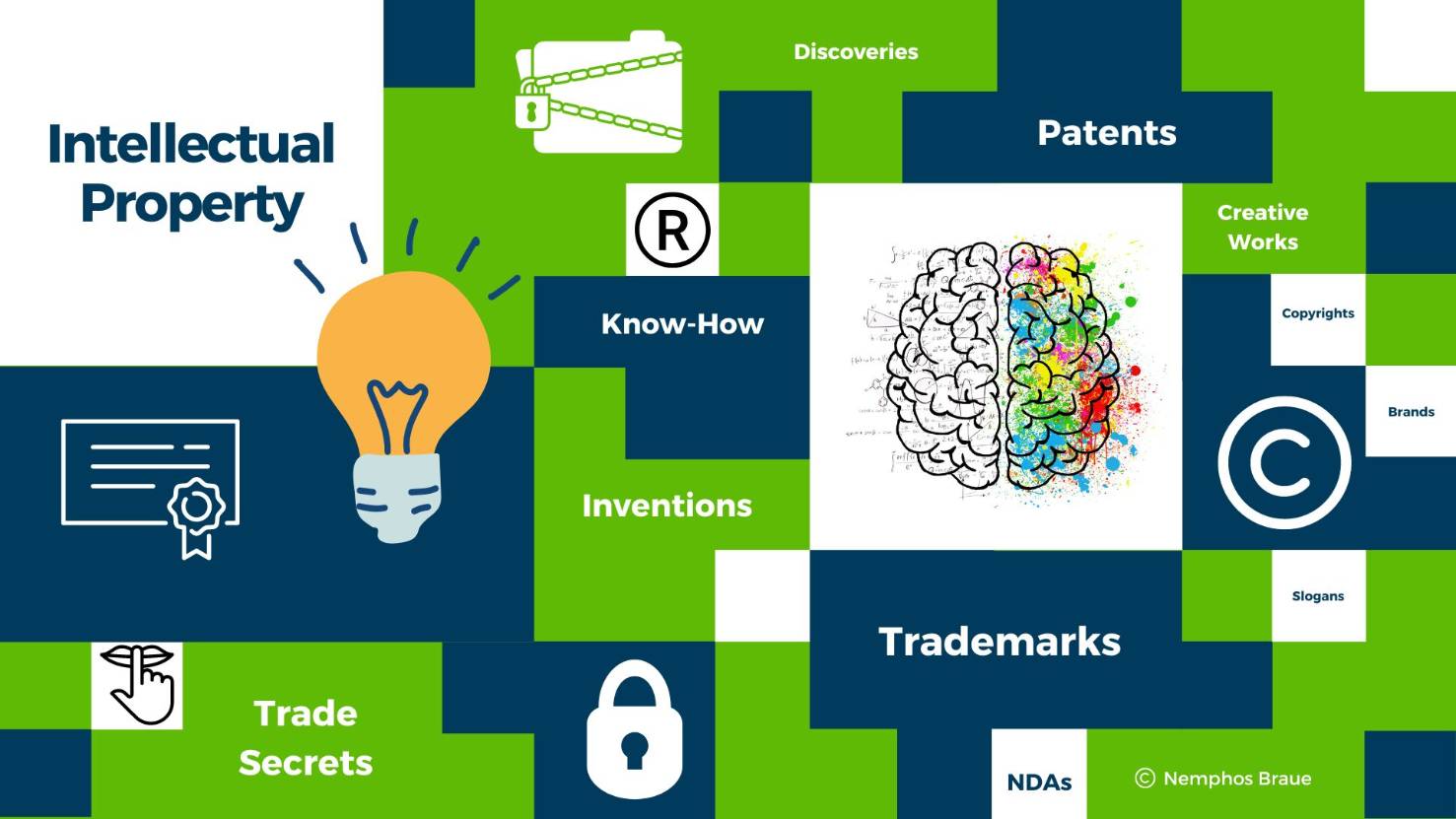IP for Entrepreneurs
Both urgent and important, protect your company’s intellectual property from the start.

What entrepreneurs need to know about IP
Protecting intellectual property (IP) is an urgent matter because, unbeknownst to many entrepreneurs, some IP rights (IPR) can be lost if not protected before you begin using your IP to build your business.
What are the different types of IP in a business?
Most IP can be divided into a few basic types, and together, represent significant assets for your business.
- Know-how.
- Brands.
- Creative works.
- Inventions and discoveries.
Generally speaking, know-how is how you do what you do and, as such, represents a substantial asset of your business. It includes confidential information that your business possesses about your customers and vendors, how you price your goods and services, etc. Unlike the other types of IP, know-how is possessed by every or nearly every business.
Brands are how you distinguish your goods and services from your competitors. Therefore, it is important to select brands that are not similar to your competitors and not merely descriptive of your goods and services. Brands are also how your customers come to identify your business and the goods and services your business provides. Due to this identification, brands tend to hold the goodwill that you generate with your customers. As such, your brands can represent a substantial asset of your business.
A creative work may be expressed in any tangible form — written, audio, video, etc. — and may actually be the goods or services being sold by the business or works that are intended to help the business sell its goods and services, such as websites. As you might expect, particularly when the creative works are the goods and services being sold by the business, creative works can be a substantial asset of the company.
Inventions and discoveries are generally in the form of new or improved goods and services, ways of providing the goods and services or operating the business that provide your company with a competitive advantage relative to your competitors. They are often trade secrets of the business.
How and when do I protect my IP?
For all forms of know-how, the answer is contracts. A business looking to protect its know-how needs to enter into contracts requiring anyone involved with the business, namely employees, vendors and sometimes customers, to protect confidential information by not disclosing it to the public. With employees, the contracts should also require that an employee transfer know-how developed by the employee to the business. This is particularly important for employees that are hired to generate IP, such as engineers, developers and marketers.
Trademark rights in a brand come into existence the moment a business labels goods and services with a brand to identify itself as the source. Those trademark rights, known as common law rights, provide some protection in those regions where the goods and services are sold.

Trademark registrations provide a business with more rights and a broader scope of protection than common law rights. In addition, the cost of filing an application to register a trademark is usually very reasonable in most states and countries of interest, particularly when compared to the cost of rebranding if someone else registers a similar mark.
Time is of the essence when it comes to applying for a trademark registration. In the U.S., if your business is the first to use a trademark to label goods and services that are sold, then your business will often have superior rights to other businesses. However, if another business is the first to file a U.S. trademark application for a similar mark, then the other business may also accrue rights in their marks that can conflict with and diminish your trademark rights.
Copyrights in a creative work come into existence the moment the creative work is reduced to a tangible form, such as written works, audio and video recordings. Those copyrights, known as common law rights, may provide some protection, but, in the U.S. and other countries, a copyright registration is required to enforce your copyrights against an entity using your creative work without permission, i.e., an infringer.
Deciding on whether to protect inventions and discoveries as a trade secret or with a patent depends upon various factors, one important factor being whether or not it will be disclosed in the delivery of your goods and services to the public. If you want protection for your invention or discovery with a patent, then you will need to file a patent application before your invention or discovery is disclosed to the public.
Whether in technology, healthcare, consulting, retail or any industry, intellectual property can represent a significant portion of your business’ assets. Speaking with an IP attorney can help you check off the urgent and important task of protecting your IP before it’s too late.
Interested in a Consultation?
Our attorneys can assist you with a wide range of US and international intellectual property questions and issues.
Download the IP for Entrepreneurs one-sheet.
IP Services & FAQs:
Copyrights
Creative works are valuable assets for a business – protect them.
Trademarks
Build and protect the value of your brand and goodwill.
Licensing
Generate additional revenue and expand the reach of your intellectual property assets.
Patents
Protect and create additional value for your inventions and discoveries.
Trade Secrets
From your discoveries to strategies, maintain the advantage of your know-how.
